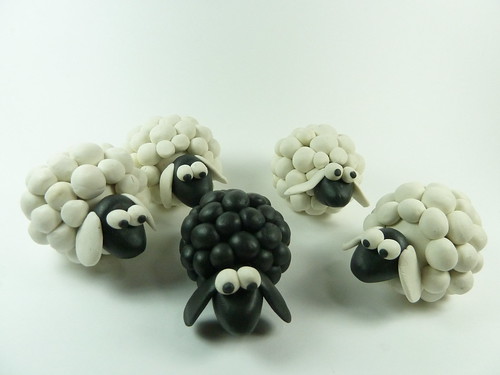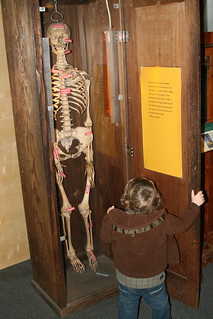 There has been some discussion on a couple other blogs this week about how we, as historians, should deal with things we find that might not be 'politically correct' in today's standards. You can read the discussion over on Genealogy’s Star blog and he older post over at Dear Myrtle’s blog so I will not get into the specifics of that discussion. But, those discussions tie into recent discussion I have had in a couple of my history classes - does the historian have moral and ethical responsibilities in their work? And if so, who is the historian responsible to?
There has been some discussion on a couple other blogs this week about how we, as historians, should deal with things we find that might not be 'politically correct' in today's standards. You can read the discussion over on Genealogy’s Star blog and he older post over at Dear Myrtle’s blog so I will not get into the specifics of that discussion. But, those discussions tie into recent discussion I have had in a couple of my history classes - does the historian have moral and ethical responsibilities in their work? And if so, who is the historian responsible to?
Jonathan Gorman, Professor of Philosophy, wrote an article titled "Historians and Their Duties" which talks about this subject and which we used in class to discuss the topic. Gorman basically says that historians do have an ethical and moral responsibility to our audience and it really boils down to telling the truth.1 I have not really given much thought to our moral and ethical responsibilities, but the class and blog discussions made me start to think about it and I have come up with my perception and thoughts.
First, the morals and ethical values are going to differ depending on who you are, your society, your religious preferences, your era, etc... People throughout the world are going to have different viewpoints on what is morally and ethically acceptable. As historians, we need to keep that in the back of our mind and try and keep our own moral and ethical values out of our written word, as much as possible - just like we try to keep our own bias out of our work.
Second, we have to remember that we are researching and writing about the past. The moral and ethical values can be very different for someone who lived in the 19th century. When we are researching and writing about those in the past, we have to try and think within the context of whom we are researching. What did they consider as morally acceptable? For instance, if we are writing about the experiences of our female ancestors from 100 years ago, we have to realize that what women were expected to do and what they were excluded from doing is very different than what we think today. It doesn't matter if we disagree with how women were treated in the past, we have to interpret and then write from the perception of the people of that time.
One last thought that can plague the family historian and one that, I think, separates us, the family historian, from other historians. We are generally researching and writing about our own family. We have a true emotional connection with the people we are writing about and we have an even more emotional connection with our intended audience - other family members. As we discover facts and stories about our distant ancestors, we will probably discover things that they did that were perfectly acceptable in their time, like owning slaves, but are completely forbidden in modern times. Or we may find information that living family members may not want to know. We have to decide what to do with those facts.
 For instance, maybe one of your living ancestors was adopted and you have uncovered who the biological parents are. Your ancestor has never had any interest in knowing who their biological parents are. Do you include the information or discreetly hide it? What if the scenario is a little more complicated. Maybe your adopted ancestor is not still living so you think maybe it is OK to share what you found about the biological parents. Before you do that, did you think about the other adopted siblings of your ancestor? Did you think of the biological mother or father? They have lives and families that may be dramatically affected by your findings?
For instance, maybe one of your living ancestors was adopted and you have uncovered who the biological parents are. Your ancestor has never had any interest in knowing who their biological parents are. Do you include the information or discreetly hide it? What if the scenario is a little more complicated. Maybe your adopted ancestor is not still living so you think maybe it is OK to share what you found about the biological parents. Before you do that, did you think about the other adopted siblings of your ancestor? Did you think of the biological mother or father? They have lives and families that may be dramatically affected by your findings?
As an academic historian, I would say that we have to include those facts because if we do not then we are not telling the true story of the past. However, as the family historian, we have to consider our audience and that Great Grandma Edna may be crushed to hear such a story. It may not be acceptable to some people in the family, who are still alive, to have 'shady' characters or 'black sheep's' in their past.
There is no true 'right' answer to these moral and ethical concerns that will apply to everyone. I think it really comes down to each of us, the family historians, to be able to face ourselves each morning that we wake up and know that we did the 'right' think - whether we cover up a 'questionable' ancestor or post it out there for the whole world to see.
What do you think our moral and ethical responsibility is as family historians? Have you found information similar to what I’ve described? What did you do with it? Let us know in the comments.
Thanks for reading and keep diggin’ for that family
Chris
1 Johnathon Gorman, "Historians and Their Duties", History and Theory, Theme Issue 43 (December 2004), 115
Black Sheep photo courtesy of Leon Riskin on Flickr
Skeleton photo courtesy of Andrew Ballantyne on Flickr

No comments:
Post a Comment